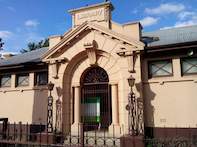Carnegie Art Gallery
Newcastle arts and crafts can be seen all over the town and its various buildings. Carnegie Art Gallery was erected on the site of the public gallows in 1915. It was converted into a museum in 1980, and became a world-renowned art gallery in 1991. It is a National Monument and its architecture is in the Victorian Classic Style.

All the original features have been retained and it is situated in the oldest quarter in town.
This municipal gallery boasts a small but rich permanent collection of South African contemporary art. A collecting policy built around the theme of landscape and a particular focus on the art and craft of the Newcastle region give the collection coherence.
Its collection includes contemporary paintings, sculptures, ceramics, fibre art, beadwork, weaving and wooden carvings by critically acclaimed and recognised South African artists. A unique and valuable collection of African Art and Zulu material cultural objects has also been accumulated.
The gallery is committed to the development of the viable craft industry in Newcastle. Many workshops for craft development skills are held for unemployed people.
The Art Gallery holds regular temporary exhibitions and art events and promotes local arts and crafts through its shop. A list of talented artists and crafters can be obtained from the gallery.
The shop has a wide variety of other items for sale including Zulu beadwork, gemstones, object d’art, traditional Zulu beer pots and items made from waste materials such as telephone wire and papier mache.
The Carnegie Art Gallery is well worth a visit, to view the art and to understand how this small Art Gallery has made a difference in so many artists’ lives.
Makhelwane Craft Shop
Makhelwane Craft Shop is situated at Ingogo Farm, away from the town buzz, where it’s quiet and surrounded by beautiful mountains. It can be found on the Johannesburg Route via Volksrust – and is 15km away from Newcastle. Makhelwane consists of a two-room shop and parking area, and activities offered include Indlamu and Ingonabusuhu. The unique feature of the shop, is that they sell products that are produced on site, including traditional homemade medicine.
Items for sale – Imvunulo eg amabheshu, beads, necklaces, rings etc; various kinds of baskets, weaved out of grass. Woven carpets and bags, wooden bowls, wooden carvings, beer pots, walking sticks, jacaranda trays, traditional sandals (ingcabulela) and traditional medicine. Thatched roofing is done on request.
Masizithuthukise Multicultural Art and Craft
Masizithuthukise means ‘let’s wake/stand up and do something’ and this is exactly what the founders of this project are doing. No substantial funds have yet been raised, but the group has persevered and continue to assist teachers at the local schools with training and educating the children in a number of areas that the group are passionate about.
They are involved in visual art in the form of various dances, including gumboot dancing, music, drama and American traditional barn dancing. For their art, they have used available resources like waste products to start this project. Visual art includes fabric-painting, art using matchsticks, paper mache and stencilling. They focus on community development and help at both Sipmeni Primary School and Buhlebomzinyathi High School schools in Madadeni.